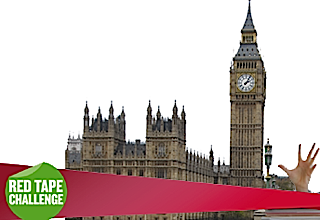UK government online consultation to streamline and discard supposedly obsolete legislation listed some of the UK’s enabling legislation for EU directives and the CAP. The UK Cabinet Office’s so-called ‘Red Tape Challenge’ invited UK voters to comment on supposedly trivial environmental regulations that: “…aim to conserve vulnerable or rare species, habitats and wildlife sites. They also control access to footpaths and national parks.”
Topping the list, however, were:
- The Rural Development (Enforcement) (England) Regulations 2007
- The Rural Development (Enforcement) (England) (Amendment) Regulations 2010
- The Wildlife and Countryside Act 1981 (Amendment) Regulations 1995 (enabling legislation for the Council Directive 79/409 EEC on the conservation of wild birds)
- The Conservation of Habitats and Species Regulations 2010 which transpose the Habitats Directive (92/43/EEC) into UK law.
According to provisional select committee evidence submitted by environment minister Caroline Spelman last week, the red tape challenge consultation has generated about 200 recommendations on agriculture. The environmental recommendations will be reviewed “…I think in March.”
The minister was evasive in answering the committee’s questions as to meetings between the Cabinet Office, presided over by former Thatcher adviser Oliver Letwin, and Spelman’s ministry, the Department for Environment, Food and Rural Affairs (DEFRA). The Commons Environmental Audit Committee wanted an assurance that the UK’s environmental regulations were not going to be condensed into a 50-page document: Spelman said she: “…not in a position to confirm or deny a story in a newspaper.”
Green MP Caroline Lucas asked how Spelman would respond to a Cabinet Office suggestion that the UK’s environmental regulations should be condensed into 50 pages. Spelman stonewalled: “…I am not answering a hypothetical question.”
Unlike her Cabinet Office colleagues, however, Spelman made the distinction between UK and EU legislation: “I am talking about domestic regulation now; this does not cover European regulation. Of course, an awful lot of environmental and agricultural regulation is determined at European level – 80% of it.” The minister also confirmed, under repeated questioning, that DEFRA and the Cabinet Office did meet, a point that had been contested in the wake of a blog post published by The Guardian.
Lucas later said: “I don’t know which is more worrying – the fact that Oliver Letwin has reportedly proposed slashing all environmental guidance so it fits into a 50 page document, or that the Secretary of State for the Environment appears to have had no knowledge of it.”
Last year, Lucas warned that the so-called ‘red tape challenge’ was nothing of the sort. On her website she wrote: “This exercise isn’t really about cutting ‘red tape’ and ‘listening’ to the public – it’s an opportunity for the Conservative-led administration to refocus the political debate predominantly in favour of business interests and deregulation.”
Earlier today, ARC asked the Cabinet Office three questions concerning this:
- Did the Cabinet Office discuss the choice of the 163 pieces of legislation listed in the LH box with DEFRA prior to April 2011?
- Your red tape challenge website tells me that it has registered over 1,400 views on biodiversity and habitats (between April 2011 and February 2012): will they all be reviewed?
- At what level has the Red Tape Challenge been discussed between the Cabinet Office and DEFRA since October 2011?
Here, for the record, is the answer (in extenso):
“We have regular meetings with DEFRA at all appropriate levels on all relevant issues. All views registered on the RTC website will be considered.”






